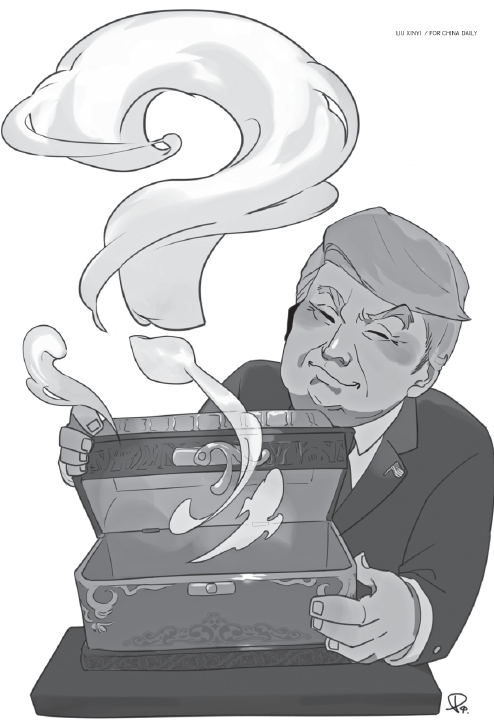What Trump means for China
Updated: 2016-11-11 07:53
(China Daily)
|
|||||||||
 |
|
LIU XINYI/CHINA DAILY |
New chapter in relations about to be written
 |
|
Shen Dingli is a professor and associate dean of Institute of International Studies, Fudan University. |
Although Trump won the Elect-oral College vote, the president-elect lost the popular vote, and the election has revealed a deeply divided US.He has an unshirkable responsibility to reconcile the country when he enters office.
Many foresee the US having difficult relations with China under his leadership, especially if he honors his campaign vow to impose punitive tariffs of up to 45 percent against Chinese goods, which would surely result in a trade war erupting between the two countries.
However, one should consider that Trump is a businessman first and foremost, and he has already worked with the Chinese side for over three decades, regardless of any differences in political opinions. And as president, he will need to be pragmatic.
Indeed, it is reasonable to expect fair practice in conducting business. President-elect Trump should be mindful that although his campaign rhetoric has taken him to the White House, it will ruin his presidency if he tries to put it into practice. It is highly unrealistic to expect to impose upon others without backlash.
Actually, the arbitration mechanism of the World Trade Organization is already in place to reconcile trade disputes among member states. There is no reason or conceivable benefit for the Trump administration to bypass it.
The three main issues that cause friction between China and the US are human rights, trade and security. Again, as a business-man, Trump might take a more practical rather than ideological approach, while still respecting US values. As China has also toned down its attachment to ideology in terms of external relationships, the two countries might be better able to reconcile their differences under the Trump administration.
Turning to regional security, China is just safeguarding its territory and rights in the East China Sea and South China Sea, not attempting to impede any of the US' so-called freedom of navigation operations in the region. China has persistently proposed to resolve the territorial and maritime disputes it has with some of its neighbors through peaceful means, and has so far managed to shelve the disputes with the Philippines and Malaysia. Therefore, the Trump administration might keep away from the disputes.
Meantime, Donald Trump has pressed Japan and the Republic of Korea to share more of the costs of deploying US forces in these countries. He has indicated he would be inclined to bring some of the forces home should Japan and the ROK decline to pay up.
As US president, Trump will have to overcome a tendency of strategic shortsightedness by continuing to present public goods in the Asia-Pacific region and not seeking hegemony.
To sumup, the election of Trump as the next leader of the US presents both opportunities and challenges. As long as he adheres to a pragmatic approach, his administration can hopefully build up a collaborative and mutually beneficial partnership with China and other countries. His lack of experience and over-confidence bring uncertainties and could cause him frustration that might lead to impulsiveness. But at present, Sino-US relations are waiting to write a new chap-ter and it remains to be seen what will be written.
Today's Top News
Alibaba Singles Day sales hit 10b yuan in 7 minutes
Obama, Trump meet at White House
Xi congratulates victor Trump
Polls missed support for Trump
Superstars party with Jack Ma before shopping spree
Europe would elect Clinton: Poll
UK 'will stick to planned EU departure plan'
UK PM May promises EU exit 'in full'
Hot Topics
Lunar probe , China growth forecasts, Emission rules get tougher, China seen through 'colored lens', International board,
Editor's Picks

|

|

|

|

|

|







